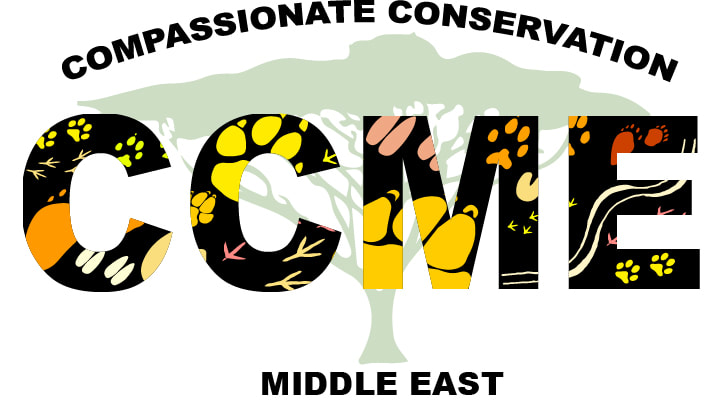
The Conference
A unique regional conference bringing together international and regional academics to explore real-world examples, methods and techniques for sharing space and conserving key wildlife species across borders.
Created by Compassionate Conservation Middle East (CCME), the conference is situated in the Jordan Valley Basin and its vicinity. The first international platform of its kind, academics, who are usually divided by borders, will share knowledge and work together on common issues. Over 4 days the conference will move between 3 geographically distinct areas:
Participants will lecture on human wildlife conflict in their regions leading to dialogue on how conservation can be shifted in the direction of co-existence. Since wildlife and nature have no borders, advanced regional collaboration is necessary for conservation management.
Created by Compassionate Conservation Middle East (CCME), the conference is situated in the Jordan Valley Basin and its vicinity. The first international platform of its kind, academics, who are usually divided by borders, will share knowledge and work together on common issues. Over 4 days the conference will move between 3 geographically distinct areas:
- The Arava symposium on resolving human wildlife conflict.
- West Bank field trip on emerging conservation projects.
- Golan Heights symposium and field trip on conserving and sharing space with predators.
Participants will lecture on human wildlife conflict in their regions leading to dialogue on how conservation can be shifted in the direction of co-existence. Since wildlife and nature have no borders, advanced regional collaboration is necessary for conservation management.
Regional ImportanceAs of 2015, thirteen percent of the population in Israel is vegetarian (one of the highest in the world). This movement has increased critique of all forms of animal exploitation such as animal experimentation, use of animals in entertainment such as circuses, industrialized farming of animals and certain practices in conservation management. From a practical perspective, conservation efforts are likely to be increasingly hampered by requests from the public to not harm target management species. For example, killing of roaming dogs in Israel resulted in a public outcry and a Ministry of Environment decree that they cannot be killed. By incorporating animal protection values (including biodiversity and agricultural values), and thereby decreasing public intervention, conservation programs can achieve longer term success.
Because nature has no borders conservation issues faced in Israel also affect Palestinians, Jordanians, Egyptians and the region. Compassionate Conservation Middle East is a research group that seeks to create regional collaborations to address conservation management. To achieve this we need to share knowledge and work together on issues that are either common or particular to certain areas. An emerging local project is the study of the ecological role of wolves as top predators in the middle east. The project will be conducted on the Israeli and Jordanian sides of the Arava valley, and will be compared to ground breaking research on North American wolves and Australian dingoes. Another aspect of the project is that wolves are managed differently in Israel and Jordan and therefore are likely to differ in their respective impacts (including biodiversity values agriculture). A study of the wolve’s management dichotomy may inform local nature management and agricultural practices. The International Wolf Project is led by scientists from the UTS Centre for Compassionate Conservation, Australia, and members of CCME. Our research can engage local residents and highlight the importance of the Arava region in professional circles. The research will be based at the Dead Sea and Arava Science Centre and bring international research collaborators and visitors. A biennial symposium in the Arava will draw local and international participants and highlight the challenges this region faces. We also hope to engage young adults of the region interested in volunteering and learning. |
BackgroundIn conservation practice the welfare of species typically takes precedence over the welfare of individuals. A common consequence is that individuals are killed for the sake of preserving populations. This puts two predominant social values against one another, nature preservation and animal protection. Similarly in human-wildlife conflict situations anthropogenic concerns usually take precedence over the protection of wildlife.
‘Compassionate conservation’ is an emerging discipline that builds the welfare of individual wildlife into conservation practice to improve outcomes for individuals, species, ecosystems and shared space between humans and wildlife. With a commitment to improving ethical standards in conservation and wildlife management research and practice, compassionate conservation provides new solutions to previously intractable conservation challenges. This approach breaks new ground by transcending the ongoing dilemma of choosing between animal protection and conservation by looking for synergies between these two approaches to improve conservation and wildlife management outcomes. The field of compassionate conservation is being developed at the Centre for Compassionate Conservation, University of Technology Australia, and research is growing in numerous international publications, a seminal book and a biannual international conference. Compassionate conservation is increasingly being applied and taught at a growing number of academic institutions. Recently, the Compassionate Conservation Middle East group was formed in Israel. The group’s aim is to promote the research and application of compassionate conservation regionally. |

